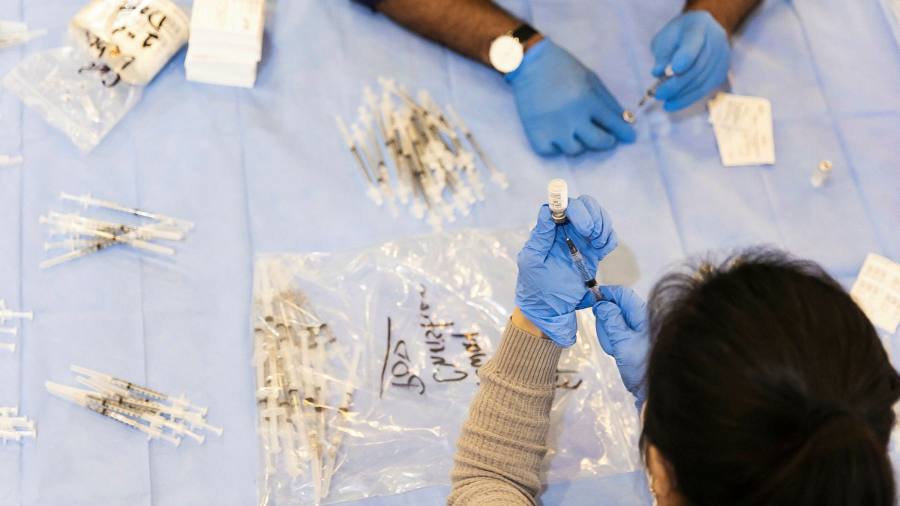[ad_1]
The writer is an FT contributing columnist
For once: an issue that doesn’t break along mindlessly political lines.
Whether to get vaccinated against coronavirus is a highly personal matter in the US, where vaccine sceptics crowd both ends of the political spectrum. Some of the whackier anti-vaxx reasons seem to be shared on both sides of the divide: I’ve heard just as many Democrats as Republicans insist the shot implants a microchip that will allow Big Brother to track the vaccinated.
But there are plenty on the left and right who appear to have saner reasons for rejecting the jab. I am not one of them. When I got my first Moderna shot, I burst into tears. As a diabetic, asthmatic, 65-year-old, I’ve been self-quarantined for nearly a year: that first shot raised the prospect of a get-off-death-row card.
Ironically, I only got my shot because so many nervous nurses and doubting doctors in my town refused to get theirs, so there were spare doses going. It gave me precisely zero pause that those staring Covid-19 in the face every day still feared it less than they feared the vaccine.
But the reluctance of the medics did sway Barbara VanSyckel, 70, a supporter of former president Donald Trump. “When medical personnel don’t get it, that influences me. What do they know that I don’t know?†she told the Financial Times. VanSyckel is not alone: a recent poll found that one in three Americans either definitely or probably will not get the Covid vaccine. Of those who are undecided or won’t get a shot, 60 per cent are worried about possible side effects, 48 per cent plan to wait and see if it is safe, 22 per cent don’t trust the government and 21 per cent think they do not need it.
VanSyckel says she is “more afraid of the vaccine than I am about getting Covidâ€, adding: “The chances of getting [Covid-19] are minute, and there is a high incidence of recovery. I think people are operating on old information. When it first came out I was just as frightened as anyone else,†but now reckons that as a “very healthy 70-year-old†she is not at high risk.
Stephen Caporosso, 42, is a Michigan auto worker who voted for President Barack Obama in 2008, but switched to Trump in 2016 and last year. He believes he does not need a shot because “the numbers I’ve seen and the average age of people who died from the virus†mean that “it’s not a virus that I personally need to worry aboutâ€. He fears the side effects. “Is it going to cause problems 10 years from now in people’s cellular structure or cell reproduction and could that be carried on to the next generation?†he asks. Caporosso is not opposed to all vaccines: when a new daughter was born during the pandemic, she was vaccinated.
Lincoln Ware, 70, an African-American talk show host in Ohio, hosted a radio call-in show on the topic ahead of getting his first dose. Vernon, an African-American caller, complained that a sister-in-law was trying to persuade his mother, a cancer survivor, not to get the shot because “this is how they’re going to be tracking you, they’re trying to kill us allâ€.
Ware referred in the show to the fact that many African-Americans distrust the US medical system because of historical abuses, including the infamous Tuskegee experiment, in which black patients with syphilis were left untreated for research purposes. But he countered: “A lot of people use that as a crutch, they don’t want to take [the vaccine] so they say, ‘Tuskegee, you know what they did to us back then’.†Listeners struck back on Facebook live. One wrote: “Flat out NOT taking. It’s not about the past, it’s about the fact that it’s still considered experimental.†Another posted: “The vaccines are all about moneyâ€, and claimed that officials were profiting from them. But one listener replied: “The rich are getting vaccinated while we voluntarily antivac: how dumb is that?â€
None of this put me off my second dose last week. Even after breaking my wrist en route to the vaccine clinic, I insisted on having my jab before going to casualty. But the strength of such opposition does make me wonder if it was pointless. If one in three Americans refuses the vaccine, new variants could make my shot less effective. It’s hard to see the pandemic ending any time soon.
[ad_2]
Source link





